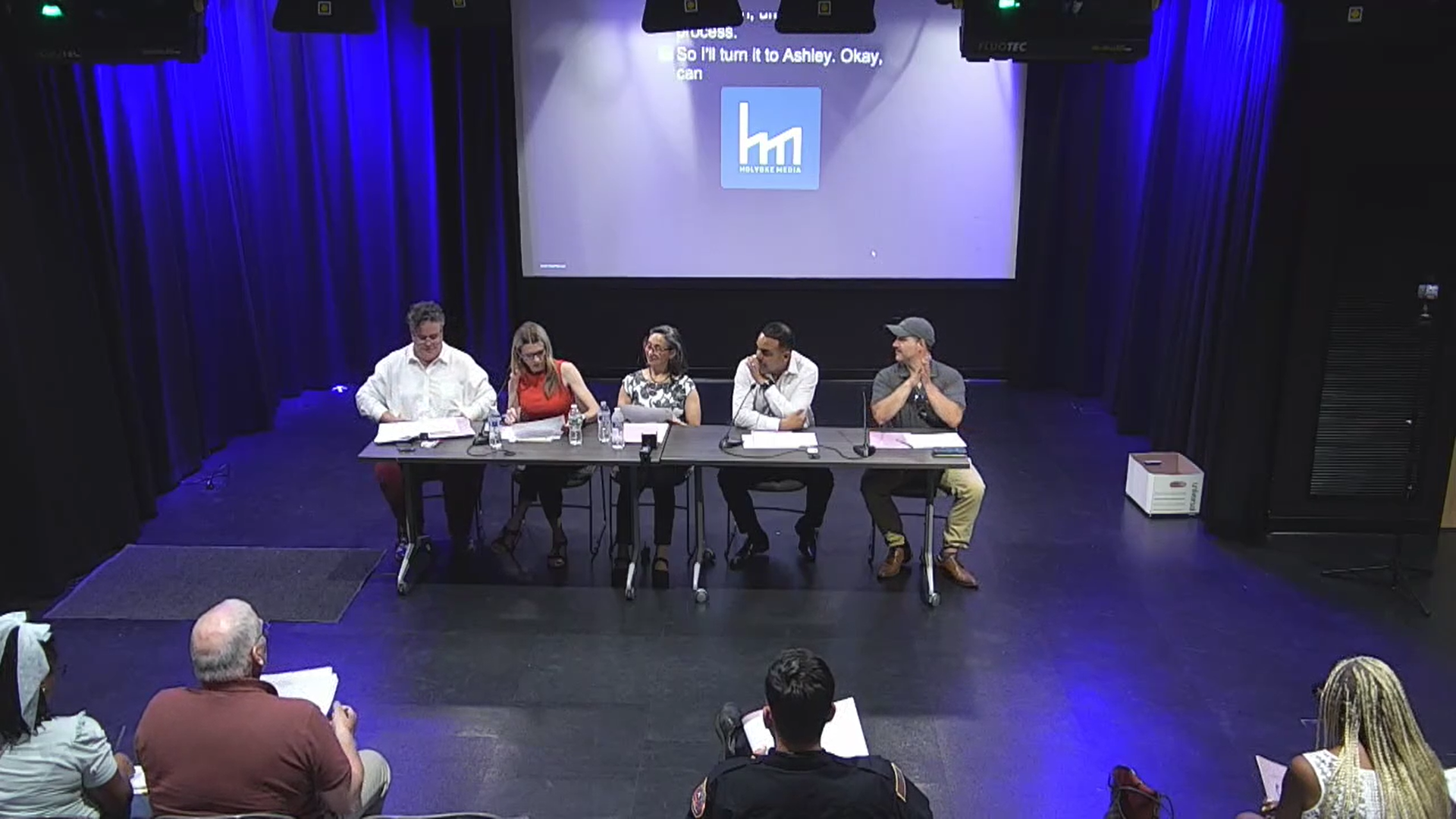Pictured, left to right, Community Development Director Alicia Zoeller, Special Programs Manager Ashley Sturges, Community Development Finance Manager Zaida Hoyt, Mayor Joshua Garcia and Board of Health Director Tim Rivers lead a panel at the community needs assessment event for opioid settlement funds.
Photo credit: Holyoke Media
HOLYOKE — Holyoke’s Office for Community Development hosted a meeting on July 15 to launch a community needs assessment to help direct the use of over $1 million in opioid settlement funds.
The meeting was hosted at Holyoke Media, where every seat was nearly filled while others were standing.
Representatives from Holyoke Health Center, Holyoke Medical Center, the Holyoke Fire and Police departments, Tapestry Health, Wildflower Alliance, Western Mass. Core, Hampden County Sheriff’s Department, Providence Ministries, Choice Recovery Coaching, Behavioral Health Network, Michael J. Dias Foundation, Gandara Center and more were present to listen and discuss the settlement funds.
The panel consisted of Mayor Joshua Garcia, Board of Health Director Tim Rivers, Community Development Director Alicia Zoeller, Community Development Finance Manager Zaida Hoyt and Special Programs Manager Ashley Sturges.
Garcia talked about the various departments present for the meeting and said, “There’s a lot of you that are in this room that play a very important function in our community as we try to navigate the quality of life challenges that are going on in our community. This opportunity, I feel like, is finally going to give me that opportunity to work with each of you in this capacity and try to navigate what we can do within the availability of this important resource.”
This meeting comes after Garcia approved the Opioid Fund Management Plan, developed by Holyoke’s Office for Community Development, which is a document that outlines the community engagement process, the allocation of funds process, the timeline and the financial management of the funds.
The Opioid Settlement Fund Management Plan can be found at tinyurl.com/4699trrt.
The city of Holyoke is one of the municipalities that will be receiving legal settlements the state’s attorney general completed with pharmaceutical companies and opioid distributors who were complicit in aiding the opioid crisis. The settlement meant that these companies would allocate funds directly to the state’s municipalities and the funds would be used to address harm done to residents, driven by the needs of each community.
Massachusetts decided to allocate 40% of those settlement funds to cities and towns across the state from 2021 to 2038.
At the time of the meeting, Holyoke had received nearly $1.15 million in total. Holyoke is estimated to receive a total of $3.6 million through fiscal year 2039.
The community needs assessment and the allocation processes will be modeled after Holyoke’s HUD Community Development Block Grant program, which emphasizes community engagement and transparency in the award of funds.
The Office for Community Development will be responsible for the allocation and fiscal management of the program and the Board of Health will be assisting with the community needs assessment.
With municipalities assigning different departments with the task of allocating the opioid funds, Zoeller explained the decision on why the funds are being monitored but the Office for Community Development in Holyoke.
She said, “The reason for that was although we are not subject matter experts in any way, shape or form in opioids, nor are we social workers or case managers or treatment professionals, what we are in the office of community development are fiscal managers, grants managers and I think our greatest skill is community needs assessment and getting folks in the room.”
Holyoke has an agreement with Massachusetts called the State Subdivision agreement, which explains how the opioid settlement funds can be spent, including enhancing opioid use disorder treatment, supporting people in treatment and recovery, facilitating connections to care, promoting harm reduction and addressing the needs of criminal justice involved persons.
The meeting served as a planning session to discuss the upcoming survey work, outreach and community needs assessment. Zoeller said focus groups, community meetings and surveys will be planned as well to help address areas of need.
After the community needs assessment, Zoeller said the next steps to utilize the funds is a grant application process and allocation process to those who applied to the city for funding before making recommendations to the mayor.



